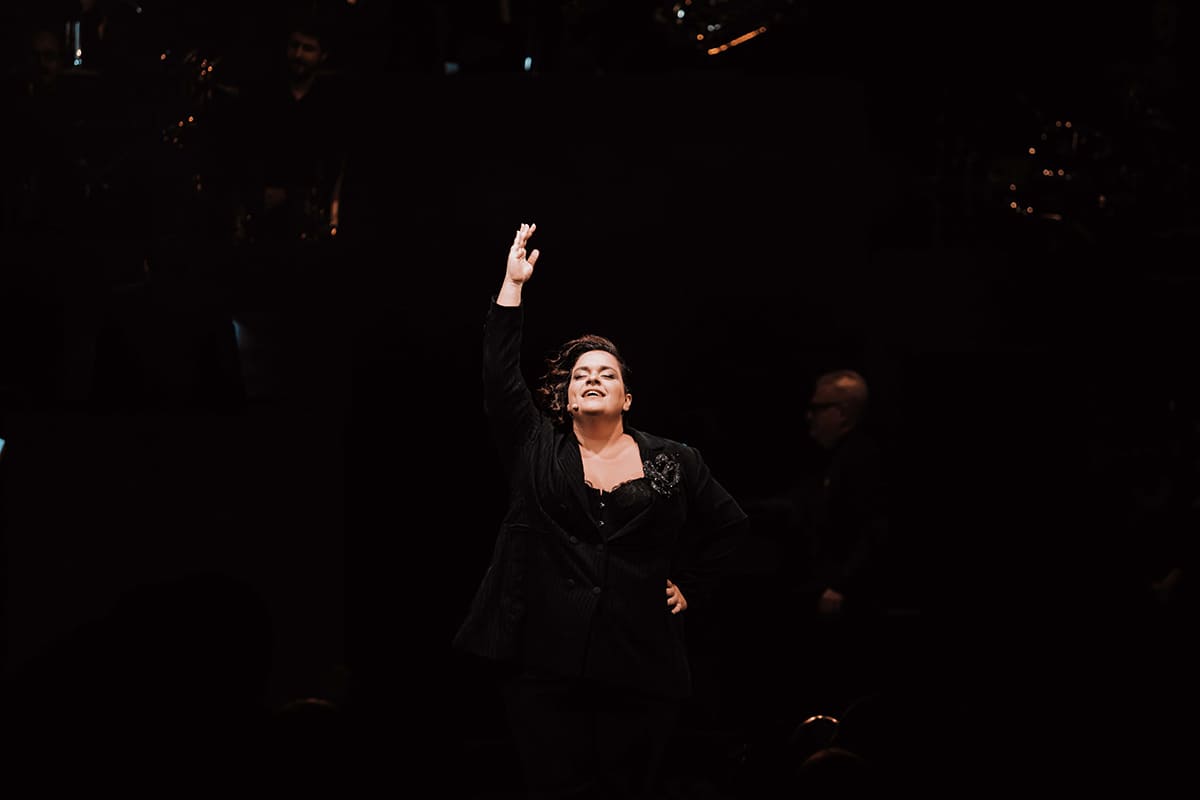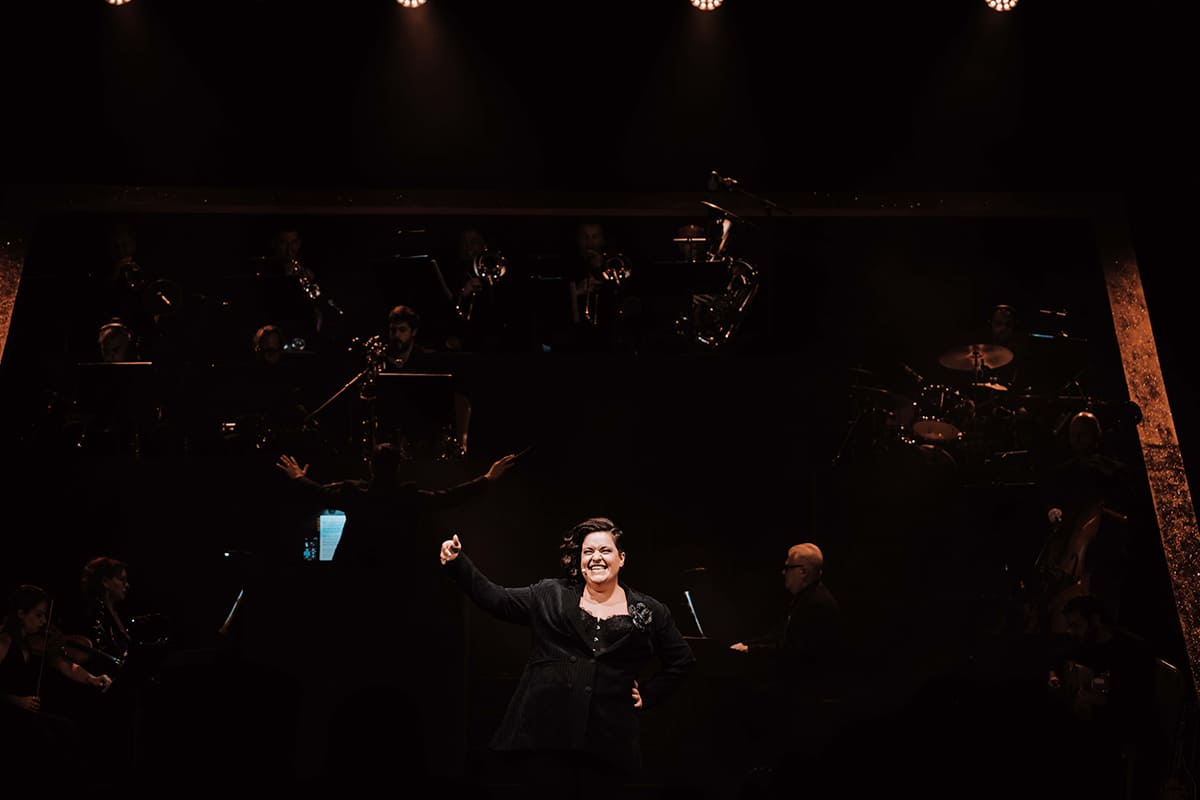From LAU to Chicago – the Musical bil Arabi: Youmna Bou Hadir Makes Her Musical Debut
The alumna reflects on her journey from singing in the LAU Choir to sold-out performances.
When artist and alumna Youmna Bou Hadir (BA ’15) landed a role in Chicago – the Musical bil Arabi she felt it was “the first step toward a big break,” an incredible realization of a childhood dream.
After graduating in English Literature from LAU, Bou Hadir specialized in creative writing, creative writing instruction and screenwriting for TV and film, and worked in marketing and journalism, while honing her singing and acting skills. Until local producer Nayla El-Khoury, who had secured the rights to adapt Broadway’s longest-running American musical in Arabic in Lebanon, offered her the role of Matron Mama Morton – “Mama Dunia” in the localized version.
In this interview, Bou Hadir speaks about the long journey from LAU to the stage, where Chicago bil Arabi was sold out both at the Casino de Liban and the Beiteddine Festival, achieving critical acclaim last summer.
Tell us about how your role in Chicago bil Arabi came to be.
Producer Nayla El-Khoury is the co-founder of a marketing agency where I worked. On one of our projects, I happened to meet the writer, choreographer and director of the musical, Roy ElKhouri. The agency project never materialized and I didn’t get the chance to work with him. But during a conversation about our interests, which overlapped, I’d mentioned to him that I was a singer. We started following each other on Instagram.
A year later, Nayla called me to tell me that she had secured the license to produce Chicago in Arabic, I was thrilled and asked her to let me know once it was out so I could go and watch it. She said: “We might want you to do more than just watch.” It was like a dream.
Apparently, when Roy and Nayla had difficulties casting for the role of Mama Morton, one of the most vocally challenging parts, Roy came across videos of my gigs in Beirut on Instagram and showed them to her.
The lesson I keep relearning is that the things that are meant for you happen seamlessly – they run like water. When something is just not for you, obstacles come out of nowhere and get in the way. But then, what is truly meant for you just happens.
How did you make Mama Dunia your own, while staying true to the original character?
I did not see Matron Mama Morton as a villain in this story because every character in the musical is a villain in a way. She actually cares deeply about the women in prison, but she manipulates them to make ends meet. Villains are complex characters and you come to understand that their “evil side” is born out of suffering.
In the 2002 film adaptation, Mama Morton as portrayed by Queen Latifah is sensual and in touch with her femininity. This was something I wanted to bring to the Arab stage – that a woman can be tough, intimidating, scary, sensual, vulnerable and funny, all at once. I hoped that people would be able to empathize with this complex character.
What do you think made the audience resonate with the performance in Lebanon?
The story is a universal one: how the media can change an entire narrative to suit ratings and rack up viewership. The musical was written in the 1970s in the US, but it speaks of a present-day struggle that we are going through in Beirut. No matter how many adaptations are made, it will always resonate with people because it depicts a system that every individual has either suffered or benefited from. From our local perspective, it spoke to audiences because it relates to the current political, economic and social climate.
Tell us about your student journey at LAU and how it led to where you are now.
I loved my years at LAU and recall them fondly. I had some of the best years there and felt that I had so much leeway to learn who I could be.
I enrolled at LAU as a freshman in 2011 and was on financial aid because my family could not really afford the tuition. The financial aid system at LAU is probably one of the most generous in the country and encourages you to do your best. Otherwise, I probably would not have been able to finish my degree.
I met some of the most supportive faculty members at LAU. Dr. Kristiaan Aercke, may he rest in peace, was my advisor in the English Department. Dr. Jenine Abboushi challenged us to think critically. Dr. Martin Loyato, a music assistant professor, was very supportive of my final-year project, even though the task did not fall under his department as it was a musical adaptation of a book – Nabokov’s Lolita. Choir conductor Leila Dabaghi offered me singing lessons free of charge because she believed I had potential. So, I sang in the Christmas choir concerts at LAU and made a few stage appearances.
These faculty members, among many others, helped shape me as a person. This is important because the university years are when one should try on different personalities to see which one fits best. Having them around to guide me through that tumultuous path was a blessing.
After graduating, I continued my lessons with Dabaghi and took free acting and writing workshops. When I finally got the chance to be in this production alongside people who had been in the industry for more than 20 years, I put the bits and pieces I had learned into my performance.
Did your background in English Literature inform your role in the musical?
Analyzing a piece of writing involves so many different layers: understanding the context, the historical facts, the social climate of the time, and the author’s psychological and mental state at the time of writing. Then you realize you are employing those analytical skills in your everyday life, in conversation, in an interview, and in developing a show, where you’re working on the other end instead of analyzing a text that already exists.
I think that’s the power of having gone to a good university and attended a solid program. Honestly, the better you learn to do it, the better you apply it.
What advice would you give to students who would like to pursue a career in the arts, especially in the challenging context of Lebanon’s art scene?
Keep at it, no matter what. Even if you’re told that it is not worth it or that it is not lucrative. Nothing beats that feeling when you step off that stage after a big performance. At that moment, I felt so open and vulnerable, a feeling that I shared with more than 1,000 people. There is nothing more human than that.
How can LAU continue to support the cultural and art scene in Lebanon?
I don’t think universities in Lebanon are doing that enough, so I would push LAU to do more for their students and alumni. Especially in this day and age where platforms and physical stages are dwindling, and artists find themselves frustrated by the lack of stages to explore. This is where one’s alma mater can step in and open its theaters to the community. This would not only serve the LAUers, but it would also give hope to the younger generations.
This interview has been edited and condensed for the sake of clarity.

